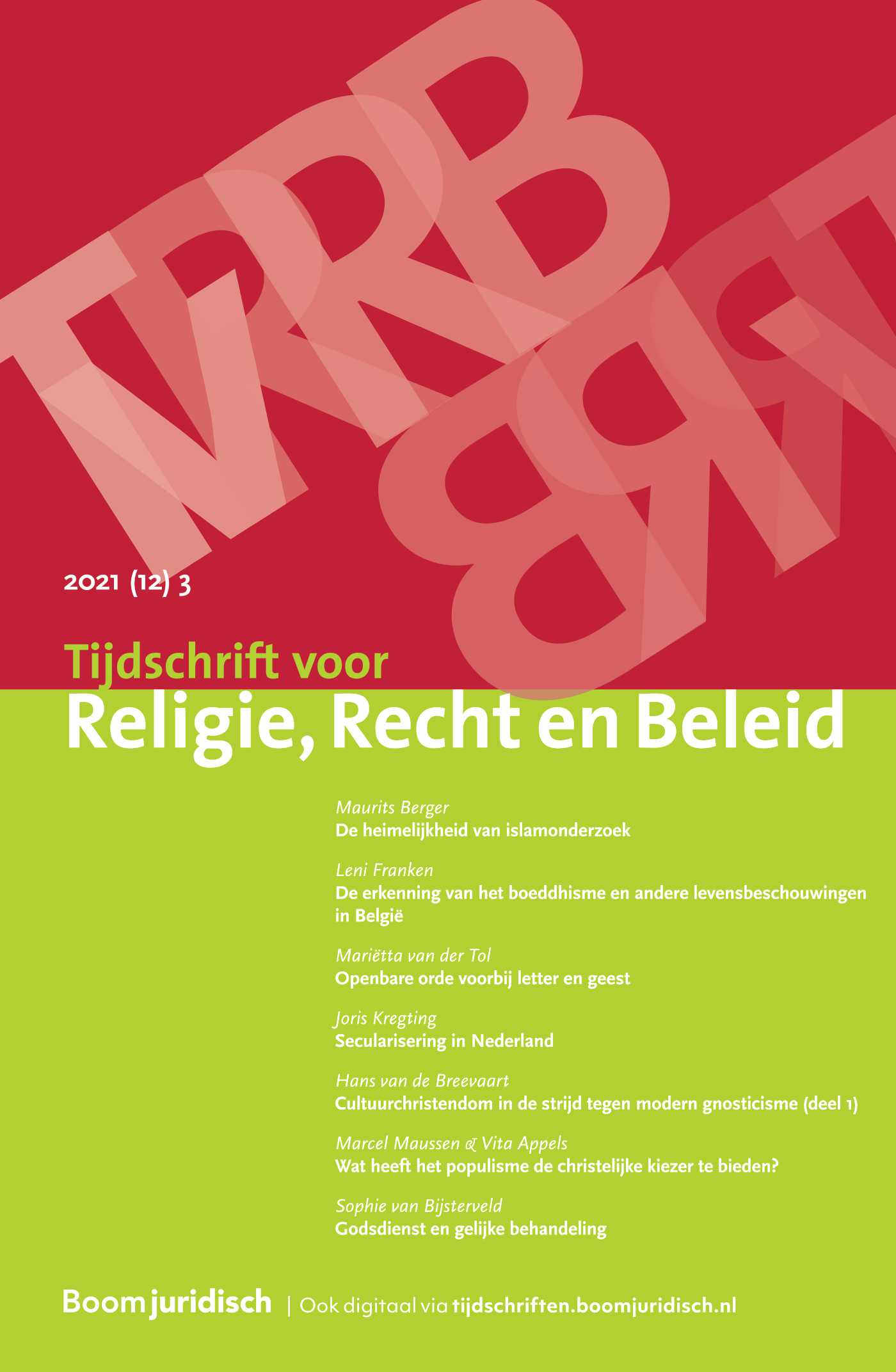|
This article reports several findings from a qualitative case study of six mosques in the Netherlands. In recent years, media, government, and society have paid increasing attention to their role, in part in relation to growing concerns of Salafist influences in the Dutch landscape. There are two major changes that can be witnessed. First, the role of the mosque as solely a religious institution is gradually shifting towards a broader interpretation. Second, there is a shift in the role of religious authority. These changes have the potential to create conflict. |


Tijdschrift voor Religie, Recht en Beleid
Meer op het gebied van Algemeen
Over dit tijdschriftMeld u zich hier aan voor de attendering op dit tijdschrift zodat u direct een mail ontvangt als er een nieuw digitaal nummer is verschenen en u de artikelen online kunt lezen.
| Overwegende ... |
Kerken, het coronavirus en de sluitingsbevoegdheid van de burgemeester |
| Auteurs | Sophie van Bijsterveld |
| Auteursinformatie |
| Artikel |
|
| Trefwoorden | moskeeën, veranderingsprocessen, moskeebestuur, salafisme |
| Auteurs | Ineke Roex en Najib Tuzani |
| SamenvattingAuteursinformatie |
| Artikel |
Homofobe en transfobe haatuitingen onder het IVBPR en EVRMOntwikkelingen en reflecties |
| Trefwoorden | homofobe haatuitingen, lhbtiq-rechten, transfobe haatuitingen, vrijheid van meningsuiting, IVBPR en EVRM |
| Auteurs | Jeroen Temperman |
| SamenvattingAuteursinformatie |
|
This article investigates if and in what manner international human rights treaties provide a mandate for state parties to combat hateful homophobic and transphobic speech. It is concluded that under the ICCPR, the path to inclusive readings of its incitement provision is principally paved by state parties. The UN Human Rights Committee welcomes states’ going beyond the codified (Art. 20) prohibition grounds of ‘national, racial or religious hatred’, thus including such grounds as sexual orientation and gender identity. Within the regional context of the ECHR, it is the European Court of Human Rights that functions as a catalyst. In recent jurisprudence, the latter court has developed a positive duty to investigate instances of hateful homophobic speech. Under both regimes a similarly steadfast approach to combating transphobic speech cannot yet be detected. |
| Artikel |
Levensbeschouwelijke vorming in het openbaar voortgezet onderwijs |
| Trefwoorden | levensbeschouwelijke vorming, burgerschapsvorming, openbaar onderwijs, Schoolidentiteit |
| Auteurs | Angelique Heijstek-Hofman, Marije van Amelsvoort en Monique van Dijk-Groeneboer |
| SamenvattingAuteursinformatie |
|
Both in the new citizenship education law and the law on secondary education, it is stated that all schools must engage in worldview education. Also, the call for the broad development of young people is becoming louder. However, public secondary education does not give structural attention to worldview education. The goal of this article is to give an overview of the situation of worldview education in public secondary education based on content analysis research of school guides. An inventory is made of whether there are elements of worldview education present at public secondary schools. |
| Artikel |
Tussen stroomversnellingen en stagnatiePolitieke onderhandelingen over subsidies voor de bouw van kerken en moskeeën, 1954-1994 |
| Trefwoorden | financiële betrekkingen tussen overheid, kerk en religieuze organisaties, bouw van gebedshuizen, beleidsonderhandelingen, verhouding kerk en staat, kerken |
| Auteurs | Leonard van ’t Hul |
| SamenvattingAuteursinformatie |
|
Between 1964 and 1976, roughly the heydays of dechurching in the Netherlands, the Dutch government contributed to the construction of 788 church buildings and one mosque through the Church Building Premium Act. After 1976, however, there was no longer any political basis for similar support of religious newcomers – apart from a few temporary subsidies to specific Muslim communities. In this article I argue that to understand developments in Dutch church-state relations it is not enough to study cultural-ideological shifts as visible in in media-outlets and parliamentary deliberations. The case of direct funding for houses of worship illustrates that dynamics of church and state relations can only fully assessed by delving into the politico-institutional context in which policy deliberations took place. This shows that political decisions about policies on religious accommodation were highly influenced by the way the trajectory of decision making was organized. Both the amount of access of faith-based organisations to the negotiation tables and the extent to which policy-debates were linked to or decoupled from concurrent policy issues mattered greatly for the outcome of policy deliberations. |
| Artikel |
Adoptie als alternatief voor abortusWaarom niet of … wel? |
| Trefwoorden | abortus, adoptie, wetgeving, alternatieven, het ongeboren kind |
| Auteurs | Patrick Garré |
| SamenvattingAuteursinformatie |
|
Belgium and the Netherlands legalized voluntary termination of pregnancy a few decades ago under certain conditions. In both legislations the abortion doctor must also investigate whether other possibilities exist to meet the woman’s request for help. In this contribution the author examines to what extent adoption can be a reasonable alternative to an abortion. It appears that adoption is often not considered in the abortion request, with the result that opportunities are lost for the woman, the unborn child and society to avoid a termination of pregnancy after all. |
| Artikel |
|
| Trefwoorden | cultuurchristendom, gnosticisme, populisme, voegelin |
| Auteurs | Hans van de Breevaart |
| SamenvattingAuteursinformatie |
|
This article tries to show how populism is taking issue with the Gnostic tendency in present-day politics Eric Voegelin had been identifying as ‘the immanentization of the eschaton’. According to populists modern Gnosticism is trying to realize the eschaton at the expense of one or more elements of reality that, according to Voegelin, had been identified in Christian culture during the course of its history, namely God and cosmos, society and men. This article elaborates on this argument by indicating how populists are used to positioning themselves over against Gnostics in the political debates on gender, immigration, climate change and the European Union. |

